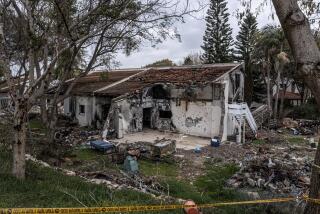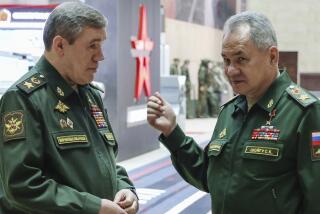Russia Probes Chechnya Abuses
- Share via
MOSCOW — Russia’s top commander in Chechnya denied Wednesday that his troops committed large-scale abuses during recent military operations, saying violations may have occurred but that they were on the “rank-and-file” level.
Lt. Gen. Vladimir Moltenskoi insisted that large roundups of Chechen men in three villages last week were carefully planned and correctly executed. An administrative review is underway, he said, to find out if individual soldiers failed to follow orders.
“I cannot talk about ‘crimes,’ ” Moltenskoi said on state television. “What I can talk about are violations committed at the level of a rank-and-file soldier or policeman. Everything was planned right and carried out correctly, but some [individual] violations were committed.”
Earlier in the day, the Itar-Tass news agency quoted Moltenskoi as telling senior officers during a meeting that “those who conducted the mopping-up operation committed outrageous acts.” But his later remarks, in response to a question about the Itar-Tass report, made clear that he meant to refer to individual soldiers, not Russian forces as a whole.
Moltenskoi said results of the administrative review will be made public in the next few days.
Russian military officials say zachistka operations, in which Chechen men are rounded up and detained for document checks, are the best way to identify rebels in the separatist republic. Detainees frequently report beatings, extortion and other abuse. Often, a few men go missing. Sometimes their corpses turn up later.
Although zachistka operations have been frequent throughout the war, roundups in three villages last week sparked an unusual furor. A large number of men were detained in Sernovodsk, Assinovskaya and Kurchaloi and later reported physical abuses that included beatings and electric shock torture. Many said they paid large sums of money for their freedom.
Pro-Moscow Chechen officials have led the chorus of criticism, saying their delicate intermediary position between the Kremlin and the republic’s citizens is increasingly untenable. Several mayors and other officials in the Moscow-backed Chechen administration tendered their resignations.
President Vladimir V. Putin’s representative in southern Russia, Viktor Kazantsev, delivered an apology to the mayors Wednesday and won their agreement to stay on in their jobs, the Itar-Tass news agency reported.
Chechnya’s top civilian prosecutor, Viktor Dakhnov, confirmed Wednesday that his office is conducting several criminal investigations into the reported abuses.
“Prosecutors in Chechnya have already said that the preliminary investigation shows that certain violations were committed,” said Kremlin spokesman Sergei V. Yastrzhembsky. “The nature of these violations and the degree of these violations, if they took place, and the people responsible for these violations--all these questions have to be answered by the investigation.”
Human rights organizations, which have been documenting similar alleged abuses throughout the nearly two-year war, have expressed surprise at the sudden public outrage over last week’s reports of beatings, torture and looting.
“What happened there is not unique,” said Oleg Orlov of the Russian human rights group Memorial. The zachistka operations, he added, form “a permanent background of violence against the innocent population.”
Orlov said there appear to be two main reasons for the unusual public reaction. First, the scale of last week’s roundups was larger--as many as 800 people at a time were taken into custody, eclipsing previous sweeps that involved detaining several dozen to 100 men at a time. Second, because two of the villages--Sernovodsk and Assinovskaya--are near Chechnya’s border, the zachistka operations set off a hasty exodus to refugee camps in the neighboring republic of Ingushetia.
In addition, pro-Moscow administrators in those two villages were not permitted to observe the operations. Memorial reported that mayors were locked inside their offices until the operation was over.
“It has been established that no crimes were committed by the federal troops,” Col. Gen. Alexander Chekalin, commander of the Interior Ministry troops in the region, said Wednesday. “At the same time, there was a whole range of deviations from official instructions and cases of misconduct, instances of disrespect and sometimes downright rude treatment, and--what is most important--the right of heads of [local] administrations to participate in these operations was neglected.”
Orlov said he has only a glimmer of hope that the investigations will provide an accounting for alleged abuses. So far, he said, prosecutors have opened 302 investigations into reports of crimes committed by Russian troops, but 213 cases have been suspended because a suspect “cannot be identified.” Often, he said, that is because civilian investigators have no access to military information and military prosecutors fail to cooperate in identifying or questioning potential suspects.
“You could say that these cases are as good as dead,” he said.
Liliya F. Shevtsova, a political analyst with the Carnegie Moscow Center think tank, said it is not clear whether Putin will push for accountability or continue to “waltz around” the issue.
“Moscow does not have a clear-cut policy toward Chechnya, especially as to how severe the methods used against rebels should be. And there is no clarity on who will assume the final responsibility for these measures,” she said.
“If anyone from the federal troops is truly punished after all this, mid-level commanders in Chechnya will stop displaying any initiative at all,” she added. “So, most probably, a little man will be found and made a scapegoat who will take the rap for everyone.”
Lt. Gen. Vladimir Moltenskoi, Russia’s top military commander in Chechnya
More to Read
Sign up for Essential California
The most important California stories and recommendations in your inbox every morning.
You may occasionally receive promotional content from the Los Angeles Times.













